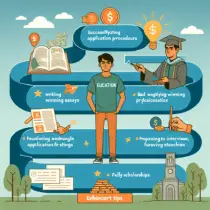Education has long been seen as the key to success and upward mobility. However, for many first-generation students, accessing higher education can be a daunting challenge due to financial constraints and lack of guidance. Thankfully, scholarships aimed at empowering first-generation students have emerged as a beacon of hope, paving the way for their success in pursuing their educational dreams.
What are First-Generation Students?
First-generation students are individuals who are the first in their families to attend college or university. These students often face unique challenges in navigating the complex world of higher education, including limited access to resources and a lack of familial support or guidance. However, they also possess incredible determination and resilience that can be harnessed through targeted scholarships aimed at empowering them.
Scholarships for First-Generation Students:
1. The Dream Scholarship: This scholarship aims to provide financial support to first-generation students with exceptional academic achievement and financial need. It covers tuition fees, textbooks, and living expenses, allowing recipients to focus on their studies without the burden of excessive debt.
2. Mentorship Programs: Some scholarships go beyond financial aid by offering mentorship programs specifically designed for first-generation students. These programs pair recipients with successful professionals or alumni who can provide guidance on navigating academic challenges, career choices, and personal growth.
3. Career Development Scholarships: Recognizing that career opportunities often arise from networking and internships, some scholarships provide support for first-generation students seeking professional experiences outside the classroom. These scholarships cover expenses related to internships or co-op placements, enabling students to gain valuable real-world experience without worrying about financial limitations.
4. Community Engagement Scholarships: Many scholarships emphasize the importance of community engagement among first-generation students. These scholarships reward applicants who have demonstrated leadership skills through involvement in extracurricular activities or community service. By fostering social responsibility and active citizenship, these scholarships empower students to make a positive impact on society.
Benefits of Scholarships for First-Generation Students:
1. Financial Relief: Scholarships aimed at empowering first-generation students alleviate the financial burden associated with pursuing higher education. By covering tuition fees, books, and living expenses, these scholarships allow students to focus on their studies rather than worrying about how to afford their education.
2. Mentorship and Support: Scholarships that offer mentorship programs provide first-generation students with valuable guidance and support throughout their academic journey. Mentors can motivate and inspire students, helping them navigate the complexities of college life and providing insights into potential career paths.
3. Increased Access to Opportunities: By providing financial support for internships, co-op placements, or community engagement activities, scholarships broaden the range of opportunities available to first-generation students. These experiences are invaluable in developing skills and networks that can enhance future career prospects.
4. Empowerment and Confidence: Scholarships specifically targeting first-generation students send a powerful message that their unique experiences and backgrounds are valued in higher education. This recognition empowers students with newfound confidence in their abilities, encouraging them to pursue ambitious goals and overcome any obstacles they may encounter along the way.
FAQs:
Q1: How can first-generation students find scholarships?
A1: First-generation students can start by researching online databases specifically tailored for scholarships aimed at empowering them. They can also reach out to college or university financial aid offices for information on available scholarships.
Q2: Can undocumented first-generation students apply for scholarships?
A2: Yes, many scholarships do not require citizenship or legal residency status as eligibility criteria. Undocumented first-generation students may be eligible for certain scholarships that prioritize academic merit or service-based criteria.
Q3: Are there scholarships available for graduate or professional programs?
A3: Yes, there are scholarships specifically designed for first-generation graduate or professional program applicants. These scholarships recognize the unique challenges faced by students pursuing advanced degrees and provide financial support accordingly.
Q4: How can I increase my chances of receiving a scholarship?
A4: Apart from meeting the eligibility criteria and submitting a compelling application, first-generation students can enhance their chances by actively engaging in extracurricular activities, volunteering, or seeking internships that align with their academic and career goals.
Conclusion:
Scholarships aimed at empowering first-generation students are transformative in providing financial assistance and support to those who strive for higher education. These scholarships play a crucial role in breaking down barriers and paving the way for success. By recognizing the potential of first-generation students and offering them opportunities to thrive academically and professionally, these scholarships are instrumental in fostering a more inclusive and equitable society.






